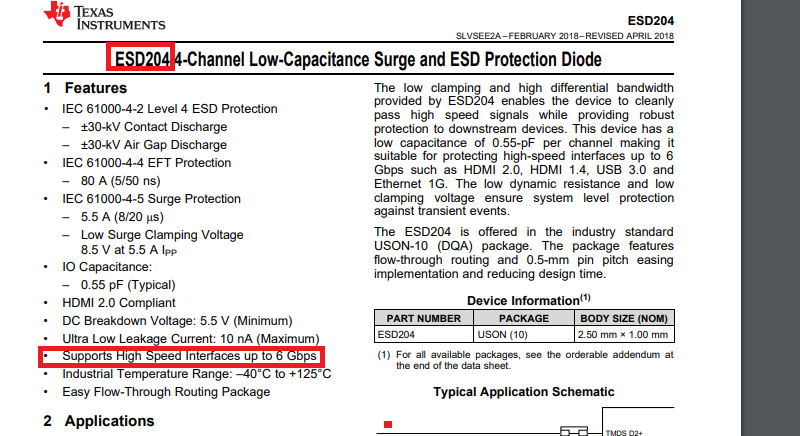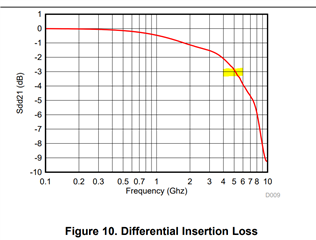Other Parts Discussed in Thread: ESDS304, ESD204
Is ESDS314 able to protect 2.5Gbps EtherNET PHY? or what alternative solution? thanks,.
Regards
Brian
This thread has been locked.
If you have a related question, please click the "Ask a related question" button in the top right corner. The newly created question will be automatically linked to this question.
Hi Brian,
I wouldn't recommend using ESDS314 to protect a 2.5 Gbps EtherNet PHY. I have provided a comparison table below with similar options to ESDS314.
| ESDS314 | ESDS304 | ESD204 | |
| Working Voltage (V) | 3.6 | 3.6 | 3.6 |
| Polarity | Unidirectional | Unidirectional | Bidirectional |
| Channel Count | 4 | 4 | 4 |
| Capacitance (pF) | 4.5 | 2.3 | 0.55 |
| IEC 61000-4-2 Contact (kV) | 30 | 30 | 30 |
| IEC 61000-4-5 (A) | 25 | 12 | 5.5 |
| Clamping Voltage (V) | 5.5 | 6 | 8.2 |
| Package | SOT-23 | SOT-23 | USON |
| Signal Speeds | up to 1.8 Gbps | up to 3 Gbps | up to 10 Gbps |
Please let me know if you have questions on the recommendations or comments.
Best Regards,
McKenzie Eaker
thanks. I have a little confused that data rate you listed is different to datasheet. 

Hi Brian,
My apologies for the confusion. If we don't specifically state the speeds then another way we determine the data rate is based on the insertion loss graph. The general rule of thumb is that we are able to support frequencies up to -3 db. Then using frequency = data rate /2, we are able to determine the data rate. This is what I had used when giving you the data rates.
The image below is the insertion loss graph from ESD204. Based on the graph, we are able to support frequencies up to 5 GHz which translates to 10 Gbps. Hopefully this makes sense and clears up the confusion.

Please let me know if you have any questions or comments on this.
Best Regards,
McKenzie